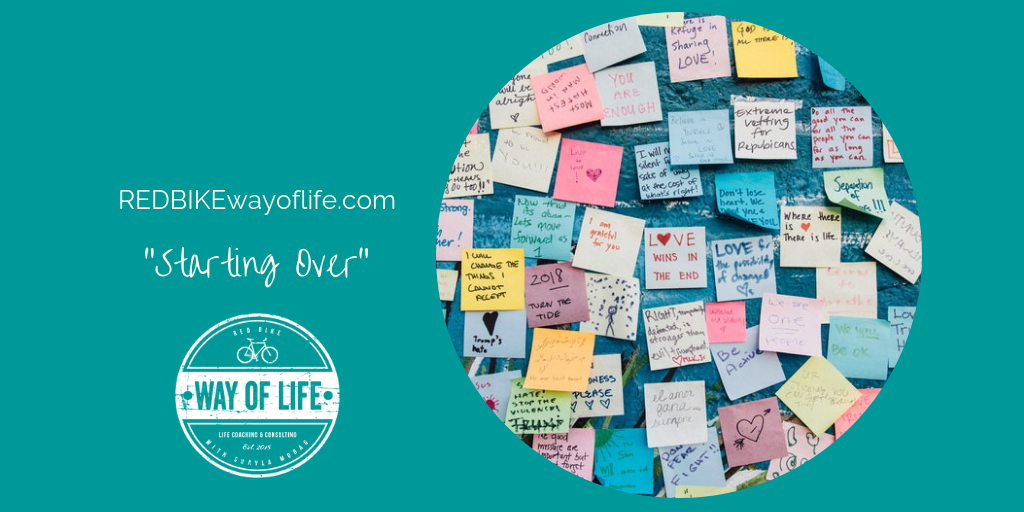
by Shayla Morag | Aug 15, 2019 | Emotional Intelligence, Forgiveness, Guilt, Self Care, Self-Compassion, The Red Bike Way
Feelings of guilt are distressing and draining. There doesn’t seem to be a cure. You’ve done or said something you regret. You’re uncomfortable without an obvious solution. What can be done about it now?
Get over your guilt with these strategies:
- Determine if you should feel guilty. Whose standards are you using? Your parents’? Your own? Your church’s? Can you be sure the source is correct? Ensure that you’re judging yourself by a set of standards you deem to be worthy. It’s your choice.
- Learn from it. Why do you feel guilty? Obviously, you did or said something that you consider to be wrong. Once you know why you feel guilty, you’re in a position to benefit from it. Ensure that you don’t repeat the behavior in the future.
- Visualize yourself behaving in a new and improved manner.
- Sometimes guilt is unproductive. Imagine that you feel guilty about missing your child’s play because you were required to work. If you did everything within your power, there’s no benefit to feeling guilt. Does your behavior require modification? If not, there’s no reason to feel guilty.
- Apologize. It can be as simple as saying you’re sorry. You’ll feel better afterwards, even if your apology is rejected.
- Accept that you feel guilty. Acknowledge your feelings and the pain that goes with them. Accept that you made a mistake. Realize that it will pass.
- Forgive yourself. Even if the other person won’t forgive you, you can forgive yourself. Be kind and gentle with yourself. No one is perfect.
- Let it go. Once the event is over, you’ve apologized, and modified your behavior, let it go. At that point, what purpose does your guilt serve? Take a deep breath, let it out, and move on. Keep your mind occupied with more productive thoughts.
- Have gratitude. Rather than saying to yourself, “I should have told Mary the truth”, tell yourself, “I’m grateful I’ve learned the importance of honesty.” Negative experiences can still be worthy of gratitude.
Avoid guilt in the future:
- Think instead of react. Guilt is often the result of acting without thinking. When you become emotional, take a moment to collect yourself. It’s easy to do or say something that you’ll later regret.
- Be less critical of yourself. Guilt and the need to be perfect go hand in hand. Avoid expecting perfection. It’s unrealistic and leads to feelings of guilt. Everyone makes mistakes on a daily basis.
- Create realistic beliefs. Maybe you believe that a good parent should do certain things, but you don’t or can’t do them. Are you sure your opinion on the matter is reasonable? Maybe you believe that a good parent would never get frustrated, which is unrealistic.
You’re not alone in feeling guilty. Some people spend a lifetime wallowing in guilt. How long you feel guilty is up to you. Learn from your mistakes and go forward with a new perspective and strategy. Apologize and forgive yourself.
The real shame is repeating behavior that results in guilt. Avoid repeating your mistakes and be gentle with yourself. Practice making the choice that doesn’t result in guilt. The more you practice, the more healthy choices you’ll make, and the less guilt you’ll have to deal with.

by Shayla Morag | Mar 15, 2019 | Handy Tips, Happiness, Health, Self-Compassion, The Red Bike Way
Happiness is elusive without a sense of self-worth. If you’re not happy with yourself, how can you be happy about life in general? Self-worth is about believing that you have value as a person. It’s not how you compare to others. It’s your belief in your intrinsic value as a human being. We’re all important. Some of us just require a little more convincing than others.
Maximize your feelings of self-worth with these 11 ways:
1) Forgive yourself. You have plenty of guilt and resentment toward yourself that you’ve been carrying around for years. You chose the wrong major in college or broke up with your significant other via text. Give yourself a break and vow to do better in the future.
2) Volunteer. Spending your time in a valuable and selfless way is a quick means to raise your opinion about yourself. Just two hours a week has been shown to make a difference.
3) Avoid gossiping. Gossip probably has gotten you in trouble in the past, and you know you shouldn’t do it. Try pointing out positive traits and actions in others, instead. You’ll both feel better!
4) Face a few of your smaller fears. We feel bad that we’re afraid of things that we know we shouldn’t fear. Face a few small fears and overcome them. You’ll be impressed with yourself.
5) Set personal boundaries and enforce them. There’s no reason to allow others to use or manipulate you. Decide what you consider to be reasonable behavior and enforce it. Word will spread, and your life will be smoother.
6) Set goals you can achieve. It’s important to have big goals, but small goals are important, too. Big goals lead to big accomplishments, but smaller goals can provide a great lift to your self-worth. Make it easy to succeed on a regular basis. Completing your daily to-do list is an example of completing a smaller goal.
7) Define your values and live by them. It’s important to determine what you’re willing to do and what you’re not willing to do, as well as what’s important and unimportant to you. If you’re able to live by these values, you won’t have a reason to think badly of yourself.
Most people don’t take the time to define their values. They rely on a vague sense of right and wrong from childhood. Give it some thought and put your ideas down on paper. When you’re stuck with a tough decision, pull out the list.
8) Be willing to make changes in your life. The same life will provide the same results. Some changes will be necessary if your goal is to enhance your self-worth.
9) Voice your opinion. Do you keep your opinion to yourself because you think no one cares? Maybe you put everyone else’s happiness above your own. Neither is good for your self-image. Your opinion matters. Share it.
10) Minimize time spent with others who don’t appreciate you. Do you have a friend or family member that drags down your self-worth? Think about letting them go or spending less time with them.
11) Make decisions. Indecisiveness creates stress and frustration. It’s also a way of avoiding responsibility. Take a reasonable amount of time and then pull the trigger. You’ll feel more in control of your life.
When you think negatively about yourself, you lower your expectations. You even begin to look for reasons to support those thoughts. This is the ultimate in self-defeating behaviors. Your feelings of self-worth influence your ability to be happy and successful. Be proud of who you are as a person. Life will be easier and more enjoyable.

by Shayla Morag | Jan 06, 2019 | Balance, Caregiving, Creativity, Self-Compassion, The Red Bike Way
Creativity
is the ability to make something new or to develop new ideas. Developing more
creativity can benefit your career, relationships, and hobbies. Children love
to be creative, but many adults have less motivation to create. There are also
many obstacles to creativity.
Stack the
deck in your favor by dealing intelligently with most the common barriers to
creativity:
Fear of
ridicule. As
they say, nothing ventured, nothing gained. No matter what you do, someone will
provide criticism. Learn to ignore the naysayers and let your creativity shine.
Fear of
failure. It can
be the fear of losing money or valuable time. Or it can be a simple fear of
failure. You’re tough enough to handle it. You’ve already failed thousands of
times in one way or another and you’ve survived. What would happen if you did
fail?
- Time and space energize creativity. It’s more challenging to come up with a brilliant idea if your kids are calling your name or your phone is chirping at you every 30 seconds. Schedule your creative time to minimize as many interruptions as possible. Early in the morning and later in the evening can be the best options for many.
- A distraction is an interruption you give yourself. How do you commonly waste time? Remove those distractions from your immediate environment. Put your cell phone on mute and throw it in the drawer. Turn off the TV. Focus 100% on your creative activity. Distractions are controllable. Have the self-discipline to control them.
Past
experiences. Your
past affects your current thinking and beliefs. Attempt to open your mind to
all the possibilities. Just because something didn’t work once in the past
doesn’t mean it can’t work today. Let go of the past and free your creativity.
Stopping
too soon. Once a good idea is found, it’s common to stop looking for a
better solution. Are you sure you’ve chosen the right color for your painting?
The right word for your novel? The right idea to make $10 million?
- Once you’ve found a good idea, keep looking for an even better one.
- Stress and creativity rarely go hand in hand. Whether it’s the stress of being tired, running out of time, financial issues, or illness, creativity is more challenging than when you’re relaxed. Find time to relax and decompress before starting a session of creativity. Your results will be enhanced.
Negative
moods. It’s not just stress.
Anger, jealousy, fear, impatience, sadness, or hopelessness can also be
barriers to creativity. Studies have shown that creativity tends to peak while
experiencing strong, positive moods.
- Do whatever is necessary to boost your mood before accessing your creativity. Take a walk, call a good friend, or listen to uplifting music. What makes you feel better when you’re in a bad mood?
Too many
options. It
can actually be easier to find your creative streak if you limit your choices.
Try to make a painting with only three colors. Write a short story with only
300 words. Or compose a song with only a few chords. Having too many choices
can be a challenge in itself. Try limiting your options if you’re stuck.
If you
can’t get your creative juices flowing, maybe something is in your way. Your
creativity is a significant part of your uniqueness. Avoid the common obstacles
to creativity and show the world what you have to offer. To really boost your
creativity, try using it regularly. And start today!

by Shayla Morag | Nov 23, 2018 | Balance, Caregiving, Health, Self-Compassion, The Red Bike Way
When caring for others, it can be easy to forget about our own needs. It may take more than an apple a day to keep the doctor away, but a healthy diet and other simple lifestyle changes can keep you from becoming ill. Learn how to develop habits that will keep you fit and strong.
Dietary Changes
Many experts blame the Standard American Diet (SAD) for high rates of obesity, diabetes, depression, and other serious conditions. Good nutrition can strengthen your immune system and lower your risk for many illnesses.
1. Eat more produce. Fruits and vegetables are nutrient dense and light in calories. They’ll boost your immune system and help you stay hydrated. Plus, all that fiber can lower your risk of diabetes.
2. Focus on whole foods. Processed foods are usually loaded with excessive fat, sugar, and salt. Try eating foods in their natural state.
3. Limit alcohol. Too many cocktails can damage your liver and other organs. Most experts recommend up to one drink a day for women and two for men.
4. Manage your weight. Carrying around too many pounds increases your risk of heart conditions, arthritis, and certain cancers. Stay slim by watching calories and leading an active life.
Other Lifestyle Changes
Here are a few more changes to go along with your balanced diet. They’ll have a major impact on your body and mind.
5. Move around. Physical activity strengthens your heart and muscles. Aim to exercise at least 3 days a week. Take the stairs instead of the elevator.
6. Sit less. Research suggests that the longer you sit, the poorer your health may be even if you exercise. If you have a desk job, try taking walking breaks every half hour. Cut back on your TV time.
7. Do yoga. While any form of exercise and relaxation can be beneficial, yoga seems especially powerful. A study at Massachusetts General Hospital recorded a whopping 43% reduction in healthcare use among patients who studied yoga for a year.
8. Deal with stress. If yoga is not your cup of tea, there are other ways to keep tension from piling up. Book a massage or listen to gentle music.
9. Be happy. The more you’re satisfied with your life, the less you’ll need your doctor. On a scale of 1 to 6, a patient could expect an 11% decrease in doctor visits for each level of higher life satisfaction, according to one University of Michigan study.
10. Adopt a pet. Holding your cat is good for mental and physical well being. The CDC says pets help people lower their blood pressure, cholesterol, and triglyceride levels. They also provide an antidote to loneliness.
11. Connect with others. Speaking of loneliness, support from humans helps too. Close social ties can help you catch fewer colds, and may even extend your life.
12. Sleep well. Adequate rest and sleep is vital to healing. Turn off the computer and TV in the evening and go to bed on time.
13. Quit smoking. Giving up tobacco may be the most important thing you can do for your health. It takes an average of 5 to 10 attempts to quit for good, so hang in there.

by Shayla Morag | Oct 29, 2018 | Change, Grief, Handy Tips, Self-Compassion, The Red Bike Way
You’ve thrown your hands up in the air and declared that something must change. Suffer a major loss? You’re ready for a fresh start. While your current situation may be challenging, the intention of making a fresh start is a good sign. It’s much better than giving up!
What do you need to change? Is it just one area of your life or do you need a complete makeover?
You can make a fresh start in any area of your life:
1. Home. Consider giving your living arrangement a makeover. You could move to a new home or change your existing home. Move the furniture or purchase new furniture. Paint the walls a new color. Convert a spare room into a room with a purpose. It could be dedicated to music, arts and crafts, or meditation.
2. Finances. Create a budget. Work a second job. Talk to a financial advisor. Find a job with a higher salary. Address your debt. Plan for your retirement. Look at your current financial challenges and finally address them with a detailed, step-by-step plan you can stick to.
3. Social life. It’s time to say goodbye to the people in your life that drag you down and replace them with those that provide a boost to your life. Meet some new friends and try a few new social activities. Work on your dating skills and catch the partner of your dreams.
4. Health and body. Hire a personal trainer and join a gym. Find a diet that works for you. Address any health issues you might have. Visit the doctor and the dentist. Try a new sport.
5. Career. Ask for a raise or change jobs. Grab your career by the horns and learn new skills that will make a difference. Consider going back to school.
6. Belief structure. Investigate a new religion or philosophy. Learn how to meditate. Question your beliefs and find a purpose. Read a good book each month and apply what you learn.
These are just a few ideas. You can also address your current relationships, attitude, or fears. It isn’t necessary to change everything at once. In fact, addressing one area at a time will yield better results.

by Shayla Morag | Jul 05, 2018 | Caregiving, Handy Tips, Self Care, Self-Compassion, Self-Talk, The Red Bike Way
As a caregiver, we can sometimes feel stuck and need to look in the right place for answers. Asking yourself questions is an excellent way to find the answers you need. The right questions can be stimulating to your thought process. Ask yourself these questions and you’ll get answers that you can use.
Ask yourself the questions that matter the most:
How do I sabotage myself? We all sabotage ourselves. We talk ourselves out of things that would lead to success and happiness. We procrastinate. We compare ourselves harshly to others.
Make a list of the ways you’ve sabotaged yourself in the past. Be on the lookout for these same patterns in the future.
How can I use more of the useful knowledge and skills I already have? In today’s world, we know more than we ever have. The average person knows enough to make a million dollars, have the body of a Greek god or goddess, and marry a supermodel. Why don’t you use all the great things you already know?
Consider all the things you know about diet and exercise. Do you apply that knowledge?
How much do you know about saving and investing for the future? What can you do to brighten your financial outlook?
How much do you know about relationships? Are you taking full advantage of that information? Why not?
Imagine what your life would look like if you applied everything you already know. Most people are convinced they don’t know enough. In reality, they just don’t perform the actions that they know to be effective or avoid counterproductive actions.
Make a list of everything you do that you know you shouldn’t. Then make a list of everything you fail to do, but know that you should.
What can I control? What can I not control? We spend far too much time worrying about things that can’t be controlled. We spend too little time effectively controlling those things that are within our realm of control
Most of our childhood and early adulthood are spent trying to control the uncontrollable. Maturing is understanding what can be controlled and then figuring out the best way to control it.
What are you worrying about right now that you can’t control?
Why am I doing all of this? Most of the things we do are for others. You might think you’re going to the gym for yourself, but you might actually be going to impress others with your amazing physique.
How much are you actually doing for yourself? How many things do you do only because others are watching? Would you drive a luxury car if no one would ever know about it?
Are your goals about satisfying yourself or impressing others? Are you only trying to live up to the expectations of others?
What is most important to me? We spend too much time on frivolous activities, largely because we haven’t defined our priorities. What is most important to you?
If you could only have one career for the rest of your life, what would it be?
If you could only be with one person for the rest of your life, what characteristics would that person possess?
What are the three places you’d most like to visit?
What are the three things you’d most like to accomplish?
What are you going to make a priority in your life?
Consider the questions you ask yourself on a regular basis. In one form or another, most people are asking themselves, “How can I distract myself until…” By asking yourself more effective questions, you’ll get the answers you need to put your personal development into overdrive.







